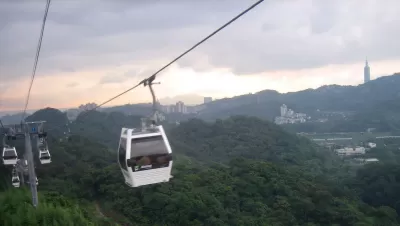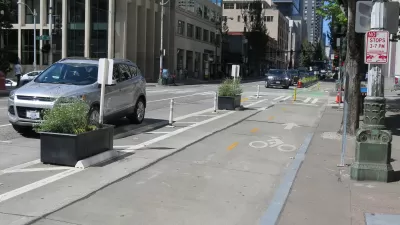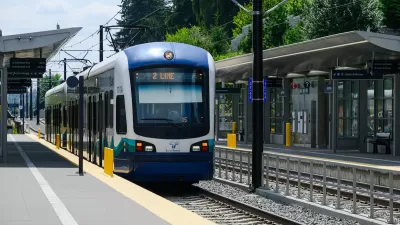Impatient with the city's light rail expansion plans, some residents are looking to aerial gondolas as a new mode of public transit.

A proposed aerial gondola could shuttle Seattle residents from downtown to West Seattle by 2024. The plan for the West Seattle SkyLink, proposed by a group of neighborhood activists, is gaining some traction as a possible alternative to existing light rail plans, which are currently projected to cost $600 million per mile and reach completion in 2031. Advocates hope to convince Sound Transit that the aerial gondola is a more cost-efficient option. The agency has reappropriated funds in the past: when safety concerns about tunneling for the Link light rail line stopped construction in 2005, the agency funded the First Hill line of the Seattle Streetcaras a replacement.
Used in some cities with challenging terrain, urban aerial gondolas can solve space issues in dense, hilly areas. In Colombia, Medellin's Metrocable system carries commuters over 9 miles of cable across the city's steep terrain. The SkyLink's proponents hope that they can convince Americans to support the technology, which, they say, could be less obtrusive and cause less displacement than other forms of transit and get built faster and more cheaply than light rail.
Opponents argue that the gondola's low passenger capacity, slower speed, and risk of inflated costs make it a much less efficient option. Citing the Medellin gondola's relatively low daily ridership, rail supporters claim that a comprehensive light rail network, planned with long-term expansion in mind, can serve more users more effectively safely than aerial gondolas.

Maui's Vacation Rental Debate Turns Ugly
Verbal attacks, misinformation campaigns and fistfights plague a high-stakes debate to convert thousands of vacation rentals into long-term housing.

Planetizen Federal Action Tracker
A weekly monitor of how Trump’s orders and actions are impacting planners and planning in America.

In Urban Planning, AI Prompting Could be the New Design Thinking
Creativity has long been key to great urban design. What if we see AI as our new creative partner?

How Trump's HUD Budget Proposal Would Harm Homelessness Response
Experts say the change to the HUD budget would make it more difficult to identify people who are homeless and connect them with services, and to prevent homelessness.

The Vast Potential of the Right-of-Way
One writer argues that the space between two building faces is the most important element of the built environment.

Florida Seniors Face Rising Homelessness Risk
High housing costs are pushing more seniors, many of them on a fixed income, into homelessness.
Urban Design for Planners 1: Software Tools
This six-course series explores essential urban design concepts using open source software and equips planners with the tools they need to participate fully in the urban design process.
Planning for Universal Design
Learn the tools for implementing Universal Design in planning regulations.
Gallatin County Department of Planning & Community Development
Heyer Gruel & Associates PA
JM Goldson LLC
City of Camden Redevelopment Agency
City of Astoria
Transportation Research & Education Center (TREC) at Portland State University
Jefferson Parish Government
Camden Redevelopment Agency
City of Claremont





























